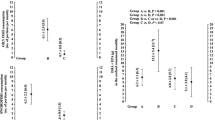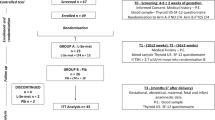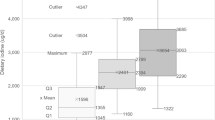Abstract
Purpose
In 236 pregnant women, we showed that selective or predominant consumption of swordfish (group A) was associated with high rates of positivity for serum thyroid autoantibodies (TPOAb and TgAb) throughout day 4 postpartum. In contrast, selective or predominant consumption of oily fish (group B) was associated with TPOAb and TgAb negativity. Rates were intermediate in group C (scanty consumption of swordfish) and group D (consumption of fish other than swordfish and oily fish). Gestational TPOAb positivity is a risk factor for postpartum thyroiditis (PPT), which evolves into permanent hypothyroidism (PH) in about 50% of cases. Purpose of this study was to verify that the different rates of thyroid autoantibodies in the four groups translated into different PPT rates.
Methods
We expanded our previous cohort (n = 412) and duration of follow-up (month 12 postpartum), and measured frequency of PPT and PH.
Results
At first timester of gestation, we confirmed the different Ab positivity rates in group A vs. group B (TPOAb = 21.7% vs. 4.7%, P < 0.0001; TgAb = 14.1% vs. 2.4%, P < 0.05). Overall, PPT prevalence was 63/412 (15.3%), but 22/92 in group A (23.9%), 4/85 in group B (4.7%; P < 0.0001 vs. group A), 17/108 (15.7%) in group C, and 16/117 (13.7%) in group D. Approximately half of the PPT women had PH, regardless of fish group.
Conclusions
In conclusion, stable consumption of oily fish (which is enriched in polyunsaturated omega-3 fatty acids) protects from PPT, while stable consumption of swordfish (which is enriched in pollutants) favors PPT. Thus, a dietary prophylaxis of PPT is possible.
Similar content being viewed by others
References
S. Benvenga, M.T. Vigo, D. Metro, R. Granese, R. Vita, M. Le Donne, Type of fish consumed and thyroid autoimmunity in pregnancy and early postpartum. Endocrine 52, 120–129 (2016)
L.M. Schell, M.V. Gallo, J. Ravenscroft, A.P. DeCaprio, Persistent organic pollutants and anti-thyroid peroxidase levels in Akwesasne Mohawk young adults. Environ. Res. 109, 86–92 (2009)
J.A. Shapiro, T.D. Koepsell, L.F. Voigt, C.E. Dugowson, M. Kestin, J.L. Nelson, Diet and rheumatoid arthritis in women: a possible protective effect of fish consumption. Epidemiology 7, 256–263 (1996)
J.J. Pestka, L.L. Vines, M.A. Bates, K. He, I. Langohr, Comparative effects of n-3, n-6 and n-9 unsaturated fatty acid-rich diet consumption on lupus nephritis, autoantibody production and CD4+ T cell-related gene responses in the autoimmune NZBWF1 mouse. PLoS ONE 9, e100255 (2014)
P.C. Calder, P. Yaqoob, Omega-3 polyunsaturated fatty acids and human health outcomes. Biofactors 35, 266–272 (2009)
W. Kong, J.H. Yen, D. Ganea, Docosahexaenoic acid prevents dendritic cell maturation, inhibits antigen-specific Th1/Th17 differentiation and suppresses experimental autoimmune encephalomyelitis. Brain Behav. Immun. 25, 872–882 (2011)
G. Fernandes, A. Bhattacharya, M. Rahman, K. Zaman, J. Banu, Effects of n-3 fatty acids on autoimmunity and osteoporosis. Front. Biosci. 13, 4015–4020 (2008)
L.C. Stene, G. Joner; Norwegian Childhood Diabetes Study Group., Use of cod liver oil during the first year of life is associated with lower risk of childhood-onset type 1 diabetes: a large, population-based, case-control study. Am. J. Clin. Nutr. 78, 1128–1134 (2003)
G.A. Jelinek, E.J. Hadgkiss, T.J. Weiland, N.G. Pereira, C.H. Marck, D.M. van der Meer, Association of fish consumption and Ω 3 supplementation with quality of life, disability and disease activity in an international cohort of people with multiple sclerosis. Int. J. Neurosci. 123, 792–800 (2013)
P. Ghadirian, M. Jain, S. Ducic, B. Shatenstein, R. Morisset, Nutritional factors in the aetiology of multiple sclerosis: a case-control study in Montreal, Canada. Int. J. Epidemiol. 27, 845–852 (1998)
W.B. Grant, The role of meat in the expression of rheumatoid arthritis. Br. J. Nutr. 84, 589–595 (2000)
S. Muntoni, R. Mereu, L. Atzori, A. Mereu, S. Galassi, S. Corda, P. Frongia, E. Angius, P. Pusceddu, P. Contu, F. Cucca, M. Congia, S. Muntoni, High meat consumption is associated with type 1 diabetes mellitus in a Sardinian case-control study. Acta Diabetol. 50, 713–719 (2013)
Fish: What Pregnant Women and Parents Should Know-Draft Updated Advice by FDA and EPA http://www.fda.gov/Food/FoodborneIllnessContaminants/Metals/ucm393070.htm. (2017). Accessed 9 Nov 2018
S. Benvenga, F. Di Bari, R. Vita, M. Le Donne, O. Triolo, R. Granese, I. Borrielli, G. Sole, M. Floridia, F. Genovesi, D. Tromba, D. Tromba, Relatively high rate of postpartum thyroiditis in the Straits of Messina area. Predictivity of both postpartum thyroiditis and permanent hypothyroidism by performing, in the first trimester of gestation, thyroid ultrasonography and measurement of serum thyroperoxidase and thyroglobulin autoantibodies. J Clin Transl Endocrinol. 15, 12–18 (2018) eCollection 2019 Mar https://doi.org/10.1016/j.jcte.2018.11.004
A. Stagnaro-Green, Approach to the patient with postpartum thyroiditis. J. Clin. Endocrinol. Metab. 97, 334–342 (2012)
F. Fidanza, G. Liguori, in Nutrizione Umana. Fidanza, ed. by F. Liguori (Idelson, Napoli, Italy,1988), pp. 345–378
S. Salvini, M. Parpinel, P. Gnagnarella, P. Maisonneuve, A. Turrini, Banca dati di composizione degli alimenti per studi epidemiologici in Italia. Milano, Istituto Europeo di Oncologia. http://www.bda-ieo.it (2015) Accessed 20 Jan 2019
J. Lazarus, J.H. Mestman. Thyroid disorders during pregnancy and postpartum. Werner and Ingbar’s The thyroid: a fundamental and clinical text. L.E. Braverman, D.S. Cooper (Eds) (Wolters Kluwer, Lippincott Williams & Wilkins, Philadelphia, 2013) 815–835
F. Guarneri, S. Benvenga, Environmental factors and genetic background that interact to cause autoimmune thyroid disease. Curr. Opin. Endocrinol. Diabetes Obes. 14, 398–409 (2007)
S. Arena, A. Latina, R. Baratta, G. Burgio, D. Gullo, S. Benvenga, Chronic lymphocytic thyroiditis: could it be influenced by a petrochemical complex? Data from a cytological study in South-Eastern Sicily. Eur. J. Endocrinol. 172, 383–389 (2015)
S. Benvenga, A. Antonelli, R. Vita, Thyroid nodules and thyroid autoimmunity in the context of environmental pollution. Rev. Endocr. Metab. Disord. 16, 319–340 (2015)
S. Benvenga, A. Amato, M. Calvani, F. Trimarchi, Effects of carnitine on thyroid hormone action. Ann. N. Y. Acad. Sci. 1033, 158–167 (2004)
L.H. Duntas, S. Benvenga, Selenium: an element for life. Endocrine 48, 756–775 (2015)
R. Negro, G. Greco, T. Mangieri, A. Pezzarossa, D. Dazzi, H. Hassan, The influence of selenium supplementation on postpartum thyroid status in pregnant women with thyroid peroxidase autoantibodies. J. Clin. Endocrinol. Metab. 92, 1263–1268 (2007)
M. Nordio, R. Pajalich, Combined treatment with Myo-inositol and selenium ensures euthyroidism in subclinical hypothyroidism patients with autoimmune thyroiditis. J. Thyroid Res. 2013, 424163 (2013)
S. Benvenga, T. Vicchio, F. Di Bari, R. Vita, P. Fallahi, S.M. Ferrari, S. Catania, C. Costa, A. Antonelli, Favorable effects of selenomethionine, myo-inositol or their combination on the hydrogen peroxide-induced oxidative stress of peripheral mononuclear cells from patients with Hashimoto’s thyroiditis: preliminary in vitro studies. Eur. Rev. Med. Pharmacol. Sci. 21(2 Suppl.), 89–101 (2017)
M. Le Donne, A. Alibrandi, R. Vita, D. Zanghì, O. Triolo, S. Benvenga, Does eating oily fish improve gestational and neonatal outcomes? Findings from a Sicilian study. Women Birth 29, e50–e57 (2016)
Acknowledgements
We thank Prof. Luigi Manasseri, physiologist and nutritionist at the University of Messina, for having reviewed the seafood consumption analysis. We thank the following obstetricians/gynecologists/endocrinologists and family physicians for help in carrying-out this study: Professor Domenico Granese, former Director of the Division of Obstetrics and Gynecology and Director of the School of Midwifery at our University hospital; professor Rosario D’Anna and professor Francesco Corrado, who succeeded as the Director of the School of Midwifery; Doctors Angela Scilipoti, Carmela Lo Re, Antonello Ardizzone, Silvia Russo, Pietro Rizzo, Emanuela Raffone, Angelo Santamaria, and Filippo Genovesi; Doctors Lorella Li Calzi, Taddeo Pappa, Salvatore Seminara, and Domenico Tromba; Doctors Umberto Alecci, Dr. Antonio Alibrando, Angelo Crescenti, Emanuele Crescenti, Santi Inferrera, Sebastiano Marino, Francesco Peditto, Riccardo Scoglio, Salvatore Totaro, Giuseppe Pantano, Giuseppe Simone and Carmen Simone. We also gratefully acknowledge midwives and nurses, particularly drs. Rita Laccoto and Franco Previte.
Funding
This work was partly supported by a grant from the Regional Department of Health (Assessorato Regionale alla Sanità, Programma per lo sviluppo del Servizio Sanitario Regionale, bando 2007, Prot. no. 3/Dip/1097) awarded to S.B.
Author information
Authors and Affiliations
Corresponding author
Ethics declarations
Conflict of interest
The authors declare that they have no conflict of interest.
Ethical approval
All procedures performed in the study were in accordance with the 1964 Helsinki declaration and its later amendments. Approval for this study was given from the ad hoc committee of the Regional Department of Health (protocol no. 3/1097).
Informed consent
Informed consent was obtained from all individual participants included in the study.
Additional information
Publisher’s note: Springer Nature remains neutral with regard to jurisdictional claims in published maps and institutional affiliations.
Rights and permissions
About this article
Cite this article
Benvenga, S., Vita, R., Di Bari, F. et al. Stable consumption of swordfish favors, whereas stable consumption of oily fish protects from, development of postpartum thyroiditis. Endocrine 65, 94–101 (2019). https://doi.org/10.1007/s12020-019-01882-4
Received:
Accepted:
Published:
Issue Date:
DOI: https://doi.org/10.1007/s12020-019-01882-4




